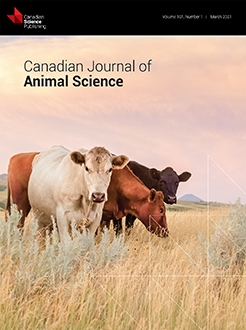Pregnant beef cows (56; 727 ± 102 kg body weight) in their second trimester were used to examine black spruce (BSP) needles and branches for replacing alfalfa silage in wintering cow diets. Five dietary treatments assessed BSP inclusion rates (0%, 15%, 22.5%, 30%, and 37.5% in the diet) for 92 d up until 2 wk before start of calving using a randomized complete block design (10–12 cows per treatment). There were linear decreases (P < 0.001) in total weight gain, average daily gain, and dry matter intakes (DMI) as amounts of dietary BSP increased. Low DMI feeding BSP may be attributed to palatability issues and lower rates of digestion. Changes in body condition score increased (P < 0.003) as dietary BSP increased. These effects are supported by corresponding linear decreases (P < 0.001) for changes in rump fat cover and increases (P < 0.001) in serum non-esterified fatty acids as dietary BSP increased. After feeding the test diets, there were no dietary treatment differences (P > 0.42) for calf birth and weaning weights as well as cow pregnancy and culling rates. Based on this study, incorporation of BSP into gestating cow diets cannot be recommended.
How to translate text using browser tools
14 July 2020
Effects of feeding graded levels of black spruce needles and branches on beef cow performance and health during mid to late gestation
C. Lafreniere,
R. Berthiaume,
L. Giesen,
C.P. Campbell,
D. Gardner,
Kip Panter,
I.B. Mandell
ACCESS THE FULL ARTICLE
It is not available for individual sale.
This article is only available to subscribers.
It is not available for individual sale.
It is not available for individual sale.
average daily gain
beef cows
beta hydroxybutyrate
black spruce
body condition scoring
dry matter intake





